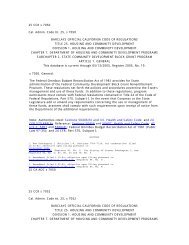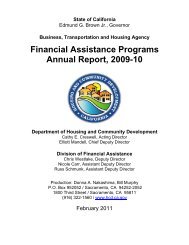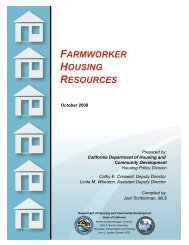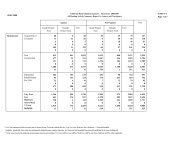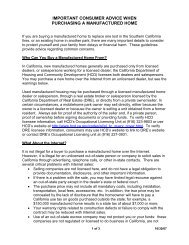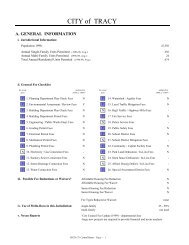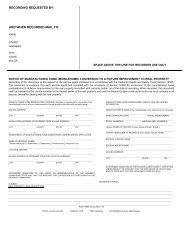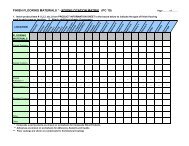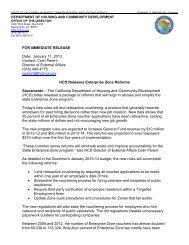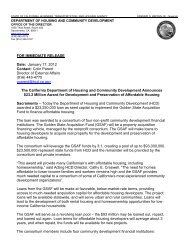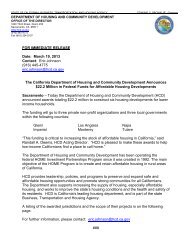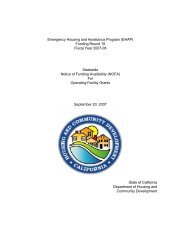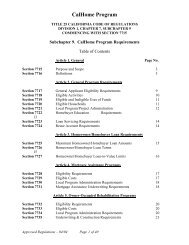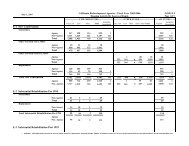Adobe PDF - California Department of Housing and Community ...
Adobe PDF - California Department of Housing and Community ...
Adobe PDF - California Department of Housing and Community ...
Create successful ePaper yourself
Turn your PDF publications into a flip-book with our unique Google optimized e-Paper software.
PUBLIC REVENUES - REGULATIONS <br />
§ 1660. Leases <strong>of</strong> Tangible Personal Property–In General<br />
(a) Definitions.<br />
(1) Lease. The term “lease” includes rental, hire, <strong>and</strong> license. It includes a contract under which a person secures for<br />
a consideration the temporary use <strong>of</strong> tangible personal property which, although not on his or her premises, is operated by,<br />
or under the direction <strong>and</strong> control <strong>of</strong>, the person or his or her employees. “Lease,” however, does not include a use <strong>of</strong><br />
tangible personal property for a period <strong>of</strong> less than one day for a charge <strong>of</strong> less than twenty dollars ($20) when the<br />
privilege to use the property is restricted to use there<strong>of</strong> on the premises or at a business location <strong>of</strong> the grantor <strong>of</strong> the<br />
privilege (see (e) below).<br />
(2) Sale Under a Security Agreement.<br />
(A) Where a contract designated as a lease binds the “lessee” for a fixed term <strong>and</strong> the “lessee” is to obtain title at<br />
the end <strong>of</strong> the term upon completion <strong>of</strong> the required payments or has the option to purchase the property for a nominal<br />
amount, the contract will be regarded as a sale under a security agreement from its inception <strong>and</strong> not as a lease. The<br />
option price will be regarded as nominal if it does not exceed $100 or 1 percent <strong>of</strong> the total contract price, whichever is the<br />
lesser amount.<br />
(B) In the case <strong>of</strong> a contract designated as a lease with any state or local government, the governmental agency<br />
designated as a lessee shall be treated as bound for a fixed term notwithst<strong>and</strong>ing any right it may have to terminate the<br />
contract to the extent that sufficient funds are not appropriated to pay amounts due under the contract. Such transactions are<br />
subject to tax as sales under a security agreement at their inception.<br />
(3) Sale <strong>and</strong> Leaseback Transactions.<br />
(A) General. Transactions structured as sales <strong>and</strong> leasebacks will be treated as financing transactions if (1) the “lease”<br />
transaction would be regarded as a sale at inception under paragraph (a)(2) <strong>of</strong> this regulation, (2) the purchaser-lessor<br />
does not claim any deduction, credit or exemption with respect to the property for federal or state income tax purposes,<br />
<strong>and</strong> (3) the amount which would be attributable to interest, had the transaction been structured originally as a financing<br />
agreement, is not usurious under <strong>California</strong> law. Transactions treated as financing transactions are not subject to<br />
sales or use tax.<br />
(B) Special Application. Transactions structured as sales <strong>and</strong> leasebacks will also be treated as financing<br />
transactions if all <strong>of</strong> the following requirements are met:<br />
1. The initial purchase price <strong>of</strong> the property has not been completely paid by the seller-lessee to the equipment<br />
vendor.<br />
2. The seller-lessee assigns to the purchaser-lessor all <strong>of</strong> its right, title <strong>and</strong> interest in the purchase order <strong>and</strong> invoice<br />
with the equipment vendor.<br />
3. The purchaser-lessor pays the balance <strong>of</strong> the original purchase obligation to the equipment vendor on behalf <strong>of</strong> the<br />
seller-lessee.<br />
4. The purchaser-lessor does not claim any deduction, credit or exemption with respect to the property for federal or<br />
state income tax purposes.<br />
5. The amount which would be attributable to interest, had the transaction been structured originally as a<br />
financing agreement, is not usurious under <strong>California</strong> law.<br />
6. The seller-lessee has an option to purchase the property at the end <strong>of</strong> the lease term, <strong>and</strong> the option price is fair<br />
market value or less.<br />
(C) Tax Benefit Transactions. Tax does not apply to sale <strong>and</strong> leaseback transactions entered into in accordance<br />
with former Internal Revenue Code section 168(f)(8), as enacted by the Economic Recovery Tax Act <strong>of</strong> 1981 (Public Law 97-<br />
34).<br />
(D) Acquisition Sale <strong>and</strong> Leaseback Transactions. No sales or use tax applies to the transfer <strong>of</strong> title to, or the lease<br />
<strong>of</strong>, tangible personal property pursuant to an acquisition sale <strong>and</strong> leaseback, which is a transaction satisfying all <strong>of</strong> the<br />
following conditions:<br />
(1) The seller/lessee has paid <strong>California</strong> sales tax reimbursement or use tax with respect to that person's purchase <strong>of</strong><br />
the property.<br />
(2) The acquisition sale <strong>and</strong> leaseback is consummated within 90 days <strong>of</strong> the seller/lessee's first functional use <strong>of</strong><br />
the property (this 90 day period does not begin to run until the first functional use <strong>of</strong> the property; a period <strong>of</strong> storage after the<br />
purchase, but before the first functional use, is not used to calculate the 90 day period).<br />
(3) The acquisition sale <strong>and</strong> leaseback transaction is consummated on or after January 1, 1991.<br />
The sale <strong>of</strong> the property at the end <strong>of</strong> the lease term is subject to sales or use tax. Any lease <strong>of</strong> the property by the<br />
purchaser/lessor to any person other than the seller/lessee would be subject to use tax measured by rentals payable. A<br />
lease to the seller/lessee at the end <strong>of</strong> the original lease term is subject to use tax measured by rentals payable unless such<br />
lease is pursuant to an election to exercise an option to extend the lease term, which option was contained in the original<br />
lease agreement.<br />
(b) Leases as Sales or Purchases.<br />
(1) In General. Any lease <strong>of</strong> tangible personal property in any manner whatsoever for a consideration is a “sale” as<br />
defined in section 6006 <strong>of</strong> the Revenue <strong>and</strong> Taxation Code, <strong>and</strong> a “purchase” as defined in section 6010 <strong>of</strong> the Revenue <strong>and</strong><br />
Taxation Code, except a lease <strong>of</strong>:<br />
(A) Motion picture films <strong>and</strong> video tapes, including television films <strong>and</strong> video tapes, whether or not they are<br />
productions complete in themselves. See, however, subdivision (d)(2) below for application <strong>of</strong> tax for periods on <strong>and</strong> after<br />
September 1, 1983, to leases <strong>of</strong> video cassettes, videotapes, <strong>and</strong> videodiscs for private use under which the lessee or renter<br />
does not obtain or acquire the right to license, broadcast, exhibit, or reproduce the video cassette, videotape, or videodisc.<br />
162



